PREFACE: This is an experiment is writing history // family history.
One interesting aspect of genealogy is the capacity to discover and explore common familial interests. One interest of mine is education and how society organizes itself so as to advance education. In my research of the Whitmire family of Butler, Pennsylvania I discovered a brief newspaper note concerning an incident in the life of Cora (Whitmire) Ohl (1884-1961), my great grandaunt. At the age of twenty, she once delivered a lecture entitled “Education.” This little fact makes me happy. This fact, and some others, causes me to wonder just how deep an interest in educational philosophy and schools runs in my family.
To understand the significant of Cora’s lecture, I’ll first provide some context regarding Butler educational history.
Butler Schools
From the 1883 History of Butler County (pg 325-326), we learn a little about the development of schools in Butler County’s Oakland Township, where the Whitmire’s resided:
The first school building was erected on the farm now owned by Martin EYTH, in 1834, and in the fall of the same year another school was held in a house which had been used as a dwelling house on the GOFF farm. William GREER taught the first school in the township. Other early teachers were John and Robert THORN, Jacob BOYD, Abraham STEVENSON, William MCCLUNG and John O’DONNELL. In 1854, when the township took its present form, public schoolhouses were built throughout the township in sufficient number, viz.: The GOFF School, the MILLINGER School, the WHITMIRE School, the DUFFY School, now called McGINLEY School. (emphasis mine)
The date of 1834 corresponds to a significant education legislation in Pennsylvania history, the Free School Act of 1834. Donald Kent, author of “The Fight for Free Schools in Pennsylvania” writes,
The Act provided that each county should be a school division, and every ward, township, or borough a school district. [It also] provided for the election of school directors very much as at the present time. The permissive features of the bill were in Sections 4,5,6 and 7, which provided for annual meetings in each county of the county commissioners-and a representative of each school board in the county. These joint meetings would decide whether a county school tax should be levied for the support of common schools, and if in favor, would arrange for a tax levy which should be sufficient to yield at least twice the amount given by the State. If the vote was against levying a tax, the districts would receive no money from the State, and would continue to operate under the Act of 1809.
This law was challenged by many communities. Many incumbents lost their legislative seats because of it, and there arose a significant effort to repeal the law. That effort, however, was ultimately thwarted. Credit is given to Thaddeus Stevens, who delivered a celebrated speech in favor of the bill and who chastised those against, saying that those in opposition
cheerfully pays the tax which is necessary to support and punish convicts, but loudly complains of that which goes to prevent this fellow from becoming criminals, and to obviate the necessity of the humiliating institutions.
The School Act of 1834 resulted in the formation of schools districts, school funds were managed by the county school board, comprised of school directors. Little information is known of the Whitmire School, except that it was directed by John Whitmire Sr (1805-1891), the second son of Francis Whitmire (d. 1832), the family patriarch. Again, from the 1883 history:
School Directors were Henry CONWAY, Capt J. GOFF, Michael MCGINLEY, John MCELWEE, Thomas MARTIN and Eli BALPH. Later Directors were Archie MCJUNKIN, Michael O’DONNELL, A.J. SIMPSON, Hugh MCCAFFERTY, Robert HAMILTON, John H. NEYMAN, Anthony HOON, John MILLINGER and John WHITMIRE. (emphasis mine)
From the 1895 History of Butler County, we learn that John Whitmire Sr must have passed on his commitment to education to his sons, Jacob Whitmire (1833-1902) and John Whitmire Jr. (1835-1916) both who are recorded as having served as school director. John filled the positions of “school director and treasurer of the district three years and a half.” (p 1017). A commitment to the common good and participation continued to extend down the family tree. Concerning John Whitmire Sr’s grandson, Robert J Whitmire (1858-1913), son of Jacob Whitmire, in McKee’s 1909 History of Butler County it is written (p 783):
[Robert J Whitmire] takes a very active interest in politics and is always willing to do his share in anything looking to the improvement of the public highways, the advancement of the schools or other public questions which good citizens are called upon to decide.
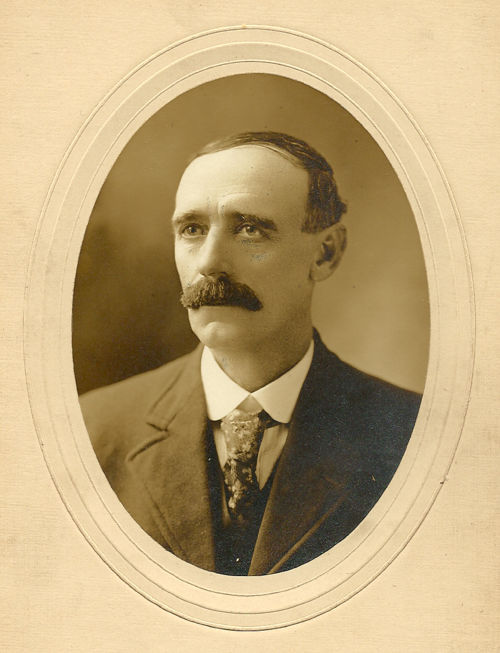
The Teachers Institute
In 1854 Pennsylvania passed another education law, the School Act, which created the role of county school superintendent. The 1895 history records Isaac BLACK as Butler’s first school superintendent. Opposition to this law also existed. Support for Mr. Black came more directly from the local citizens of Butler.
In the multiple published History of Butler County (1883, 1895, 1909), we learn about the existence of the Butler County Teachers Institute, an association organized November 19, 1855. The mission of the Butler County Teacher’s Institute was to advance the common school system and advocate for the authority and leadership of the newly formed superintendent position, part of the School Act of 1854. At its formation, the Teacher’s Institute issued the following statement:
WHEREAS, We firmly believe the common school system of Pennsylvania to be well calculated to redeem the schools of the State, and advance the sadly neglected cause of popular education, and feel that we are worthy of public confidence and support, therefore,
Resolved, That in order to promote the public interest in this respect and elevate the character of our profession, we hereby secure the allegiance we owe to that great system, by pledging ourselves to the faithful discharge of our responsible duties as educators commissioned by the State, and to a cordial co-operation with our energetic County Superintendent (Isaac BLACK), in his arduous efforts to reform and build up the common schools of Butler County.
Resolved, That in the opinion of the teachers here assembled, Mr. Isaac BLACK, our worthy Superintendent of Public Schools, has discharged the arduous and responsible duties of his office with marked zeal and ability, and that we will cordially co-operate with him in all of his efforts to elevate the common schools of the county.
Resolved, That the several Boards of Directors of this county be respectfully requested to vote a salary to the County Superintendent, commensurate with the duties of his office, which have demanded, and will continue to demand, his whole time and best energies.
Resolved, That we loudly call upon the friends of education throughout Butler County to unite with us in our endeavors to elevate the standard of teaching, and the condition of our common schools.
One activity of the Institute was to make curricular recommendations. According the 1895 History:
The school books recommended [by the Institute] were MCGUFFEY’S pictorial primer, spelling-book, first, second, third, fourth and fifth readers; RAY’S mathematics, MCNALLY’S geography, and PINEO’S series of grammars.
Other ways the Teachers Institute contributed was that it hosted academic contests and organized and provided examination committees for local high schools. The November 5th, 1879 edition of the Butler Citizen provided a detailed report of the proceeding of a week long Institute held Monday, October 27th through Friday, October 31st. Thursday’s proceedings included the presentation of awards of a spelling contest, and it recorded that 5 year old Maggie Whitmire (1874-1944) was one of nine recipients of second-place awards.
The February 18, 1904 edition of the Butler Citizen reports that county high school examinations are scheduled for the 26th of March. Cora Whitmire (1884-1961) is listed as member of the West Liberty examination committee.
But most significantly, the Institute held professional development events. According to the 1895 History,
Every year since the organization, teachers’ institutes have been held with more or less success. The thirty-ninth annual session held at Butler, December 18-22, 1893, was attended by 286 teachers … The Institute proves, by its popularity, that it holds the key to practical information for all interested in the common school system of the State.
The Butler County Teacher’s Institute worked to advance education the Butler community for nearly 100 years. It mirrored associations formed in other Pennsylvania counties.
The November 1857 edition of the Pennsylvania School Journal (Vol VI, No. 5) contains a report, submitted by J.S. REID, the Institute’s secretary, on a three day semi-annual meeting, held Oct 7-9th in Prospect. The agenda of conference included official organizational business as well as talks on pedagogy, including the best method to introduce Geography, Penmanship, Arithmetic, Physical education as well as the “best method securing order in the school room.” The event was attended by approximately 75 individuals and, according to the secretary “the discussions and deliberations were conducted with great earnestness and good feeling.”
For nearly a century, the Teachers Institute served the citizens of Butler by bringing to the region nationally-acclaimed performers and speakers. For example, Dr. James Hedley, a lecturer of national acclaim, was present at the 1889 Institute and delivered two of his lectures, “The Kingly No” and “Failure and Success.”
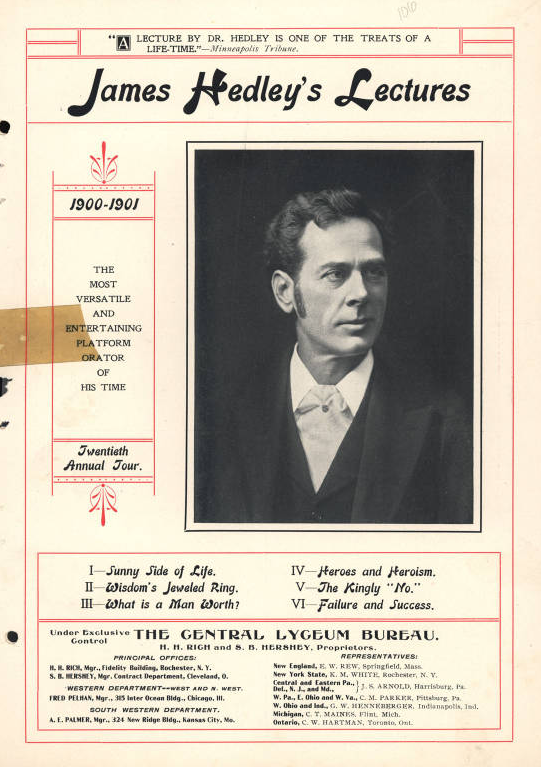
In 1901 Dr Hedley wrote an autobiography of his experiences lecturing, entitled “Twenty Years on the Lecture Platform”. As late as 1913 Dr. Hedly continued to lecture.
In December of 1902, the Teacher’s Institute included a performance by the nationally acclaimed Lotus Glee Club and dramatic recitation by Mrs. Minnie Marshall Smith.
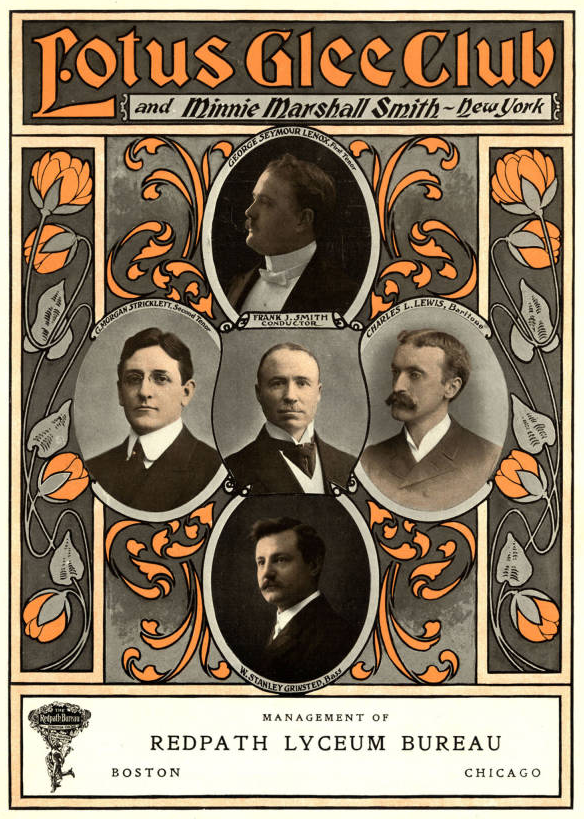
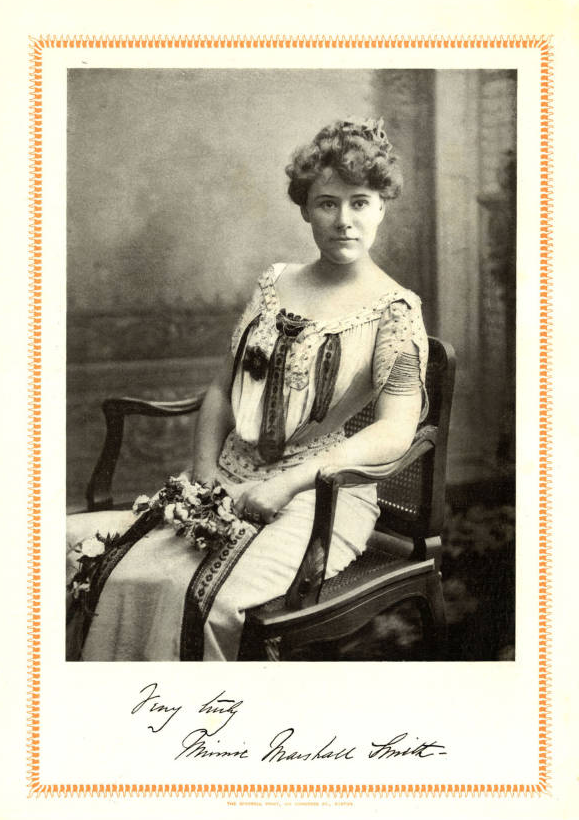
Teacher Institute events were truly professional development events, designed to bring seasoned educational professionals together with developing local professionals, sometimes with humorous results. The November 5th, 1879 edition of the Butler Citizen contains this aside regarding some of the attendees of the Institute:
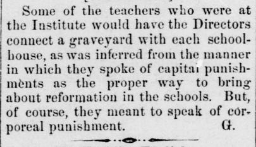
Cora Whitmire
Cora (Whitmire) Ohl (1884-1961) was a granddaughter of Jacob Whitmire, and the eldest daughter of Robert J. and Maggie (Smith) Whitmire. She was active in the Butler County’s Teacher Institute. It even appears she may have been a budding educational philosopher.
As noted earlier, the February 18, 1904 edition of the Butler Citizen lists Cora Whitmire as member of the West Liberty examination committee. She was twenty years old. The same report informed readers that the Butler County Teachers’ Institute had concluded a professional development event successfully, calling it “the most entertaining, instructive and pleasant Teacher’s Institute ever held in Butler”.
From the April 7th edition of the Butler Citizen we also learn that at smaller one-day event was held March 19th in Brady township, and that Miss Cora Whitmire was part of the agenda. It is recorded that she gave a lecture entitled “Education.” The event was well received, even though, as the April 7th edition of the Butler Citizen reported, the “weather was disagreeable.”
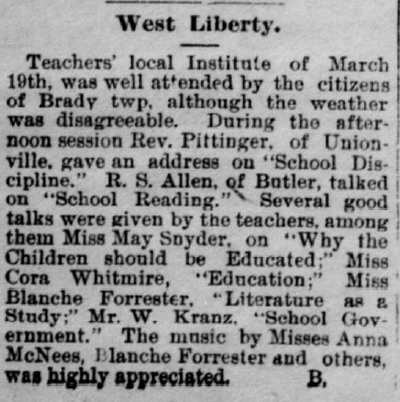
In James McKees’ History of Butler County, published in 1909, Cora Whitmire is enumerated in the biographic profile of her father, Robert J. She is said to be “a teacher at Jefferson Center, Jefferson Township.” Later that same year, June 9, 1909, Cora Whitmire married Oscar Ohl. They had eight children. She died December 14, 1961 and is buried with her husband, as well as several of their children, in the cemetery at Summit United Presbyterian Church in Butler. It is not known to what extent she continued in her educational career.
Neither is it known if a more detailed history of the Butler County Teachers Institute exists. If not, it would be a great project for an educational historian.
The Institute continued well into the 1930s. The December 16, 1930 edition of the Pittsburgh Post-Gazette announced the recent convening of the Institute and recorded an enrollment of 584 teachers.
- Brown, Robert. Ed. (1895). History of Butler County, Pennsylvania. R.C. Brown & Co. <http://www.archive.org/details/historyofbutlerc00inbrow>
- Butler citizen. (Butler, Pa.), 05 Nov. 1879. Chronicling America: Historic American Newspapers. Lib. of Congress. <http://chroniclingamerica.loc.gov/lccn/sn86071045/1879-11-05/ed-1/seq-2/>
- Butler citizen. (Butler, Pa.), 06 Dec. 1889. Chronicling America: Historic American Newspapers. Lib. of Congress. <http://chroniclingamerica.loc.gov/lccn/sn86071045/1889-12-06/ed-1/seq-3/>
- Butler citizen. (Butler, Pa.), 11 Dec. 1902. Chronicling America: Historic American Newspapers. Lib. of Congress. <http://chroniclingamerica.loc.gov/lccn/sn86071045/1902-12-11/ed-1/seq-2/>
- Butler citizen. (Butler, Pa.), 18 Feb. 1904. Chronicling America: Historic American Newspapers. Lib. of Congress. <http://chroniclingamerica.loc.gov/lccn/sn86071045/1904-02-18/ed-1/seq-3/>
- Butler citizen. (Butler, Pa.), 07 April 1904. Chronicling America: Historic American Newspapers. Lib. of Congress. <http://chroniclingamerica.loc.gov/lccn/sn86071045/1904-04-07/ed-1/seq-2/>
- Butler Co Teacher’s Institute (Nov 1857). Pennsylvania School Journal VI.5. pg 146
- Hedley, James (1901). Twenty Years on the Lecture Platform. <http://archive.org/details/twentyyearsonlec00hedl>
- James Hedley Lectures, Traveling Culture: Circuit Chautauqua in the Twentieth Century. University of Iowa. Libraries. Special Collections Dept. <http://digital.lib.uiowa.edu/cdm/ref/collection/tc/id/40411>
- Kent, Donald H. “The Fight for Free Schools in Pennsylvania” Historic Pennsylvania Leaflet No. 6 (Harrisburg: Pennsylvania Historical and Museum Commission, 1976).
<http://www.portal.state.pa.us/portal/server.pt/community/events/4279/fight_for_free_schools/473347> - Lotus Glee Club and Minnie Marshall Smith (1909) Traveling Culture: Circuit Chautauqua in the Twentieth Century. University of Iowa. Libraries. Special Collections Dept. <http://digital.lib.uiowa.edu/cdm/compoundobject/collection/tc/id/64530/rec/1>
- McKee, James. (1909) 20th century history of Butler and Butler County, Pa., and representative citizens. Chicago, Richmond-Arnold publishing co. <http://www.archive.org/details/20thcenturyhisto01mcke>
- Ohl, Oscar. Findagrave.com Memorial #111922615 <http://findagrave.com/cgi-bin/fg.cgi?page=gr&GRid=111922615>
- Pittsburgh Post-Gazette (Pittsburgh, Pa.,) 16 Dec 1930. <http://news.google.com/newspapers?nid=1144&dat=19301216&id=I0wbAAAAIBAJ&sjid=QEsEAAAAIBAJ&pg=1144,2379895>
- Waterman, Watkins & Co. (1883). History of Butler County, Pennsylvania. With illustrations and biographical sketches of some of its prominent men and pioneers. Chicago. <http://www.archive.org/details/historyofbutlerc00wate>
Very interesting. I remember the name Cora Ohl from Whitmire family reunions in the 1950s. Your grandmother and my mother, Edith (Whitmire) McClain, attended a one room school house located on the corner of North Duffy Road and Mercer Road. I recall seeing the building as a child, although I don’t recall when it was demolished. Perhaps you can find something on that school. Dad